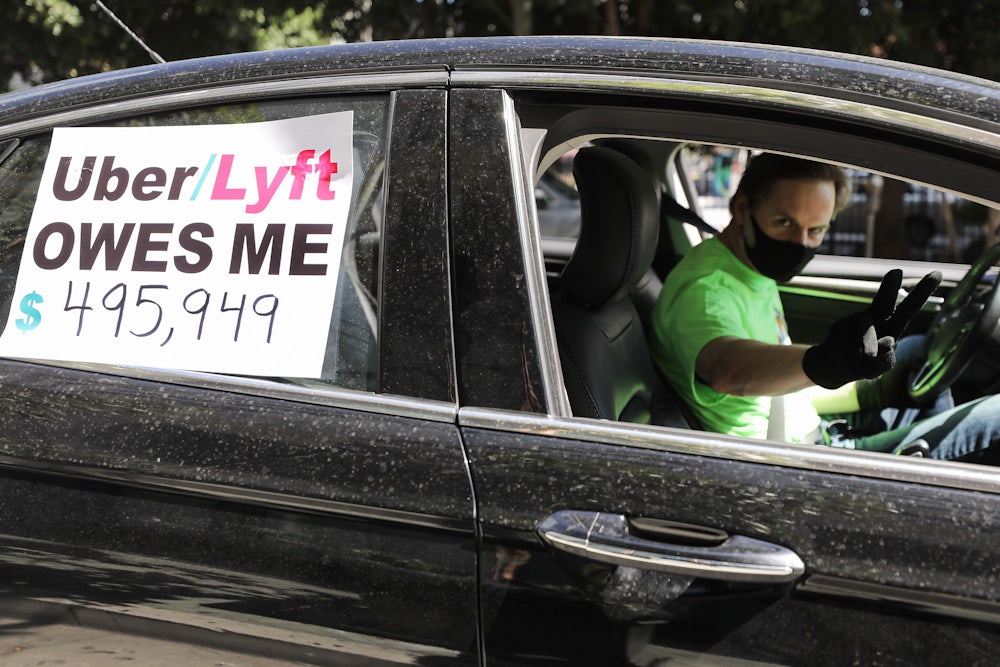This year’s presidential race has, as initially predicted, refused to end in any kind of timely or tidy manner. But we do know a bit about what happened last night in several down-ballot campaigns. One of the bleaker turns: In California, more than 58 percent of voters marked yes on the closely watched Proposition 22, a ballot measure to exempt companies like Uber, Lyft, and Instacart from treating their workers as employees rather than contractors. The measure was, from the beginning, a repellant ploy by ride-share and delivery companies to circumvent legislation from 2019 that classified a significant portion of gig workers in the state as employees.
As The American Prospect’s Alexander Sammon wrote of Proposition 22 last month, “In essence, it would formalize and enshrine an entirely new category of substandard employment for a class of workers that is made up overwhelmingly of people of color and immigrants.” Deemed contractors under the new exemption, Uber drivers and other gig workers will be largely ineligible for standard worker protections, including minimum wage and overtime, collective bargaining rights, unemployment insurance, and sick leave—right in the midst of an ongoing pandemic and economic collapse. According to a harrowing piece in The Los Angeles Times earlier this week, the passing of Proposition 22 also means that families of gig workers who contract Covid-19 on the job and die won’t be eligible for any kind of workers’ comp.
Though some polling prior to Tuesday had suggested a toss-up, the measure was always the tech giants’ to win: Between them, they dumped nearly $200 million into passing it (or approximately 10 times what the measure’s opponents raised) and launched a wildly sleazy propaganda campaign that included Instacart prompting its workers to add stickers in support of the measure to customers’ grocery bags and Uber barraging its drivers and its office employees alike with various pro-Proposition 22 materials.
Tech companies, in other words, bought themselves an exception to the law, and the consequences for gig workers in the wake of this decision will be grave. After a clear victory in a Democratic stronghold, Uber, Lyft, and other tech companies could very well look to undermine labor law in other states should they run up against it in the future. More disheartening still is that they achieved their California win by pouring vast sums of money into a ballot measure—theoretically an avenue of direct democracy—which suggests that their influence extends far beyond the usual suspects of lobbyists and pro-business politicians.
But if Proposition 22 was the most closely watched of Tuesday’s labor-related ballot measures, there were a few curious wins for workers in other states. In Florida, which broke for Trump, nearly 61 percent of the state’s voters also passed a ballot measure to increase the minimum wage from $8.56 to $15 by 2026. That was despite the usual protests from business owners and a personal entreaty to vote against the measure from Trump crony and Florida Governor Ron DeSantis, who complained, “Now is not the time. Ballot Amendment 2 would close small businesses, kill jobs, and reduce wages.” (It’s unclear, exactly, how a measure to raise wages would reduce them, and anyway, there’s also plenty of evidence that minimum wage hikes don’t lead to job losses or hobble the economy, despite the persistence of that right-wing myth.)
Workers likewise notched a victory in Colorado, where 57 percent voted to pass Proposition 118, a ballot measure to establish a statewide paid family leave program that would grant people 12 weeks of paid leave (and 16 in certain cases) to care for a new child or family members, or recover from sickness or injury. In Colorado, previous attempts to win paid leave in the legislature had faltered; it’s now the first state to pass such a program through a ballot measure. “This would be one of the largest social insurance programs that has been implemented in Colorado,” organizer Ashley Panelli told journalist Bryce Covert prior to the election.
It’s difficult not to read the ballot measure wins in Florida and Colorado in the context of the pandemic, which upended work in America, endangered the lives of millions of frontline workers, and exposed the utter inadequacy of our miserable social safety net. And at the same time, the passing of a higher minimum wage in a state that voted for Trump—along with the passing of the anti-worker Proposition 22 in deep-blue California—also tells us that partisanship alone can’t explain the odd, often messy ways that politics unfold at the state level. Whatever shakes out in the presidential or Senate races yet to be called, the ongoing fights over work and wages in this country will look much as they did before November 3. That means some setbacks, particularly in the face of nearly unlimited resources like the kind the Silicon Valley giants command—but sometimes also some quiet or unexpected progress. It’s an uncomfortable place to be stuck, with stakes as high as they are for so many working people and their families, but it’s where we are all the same.
